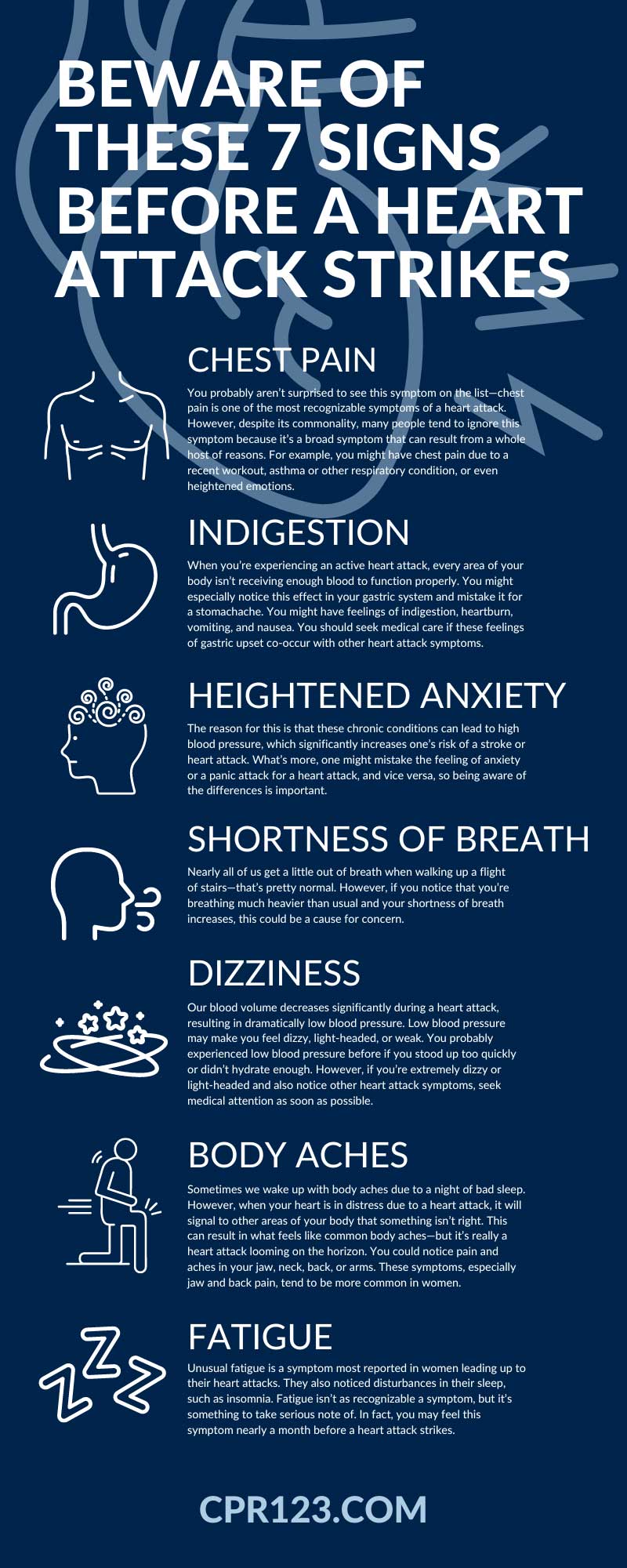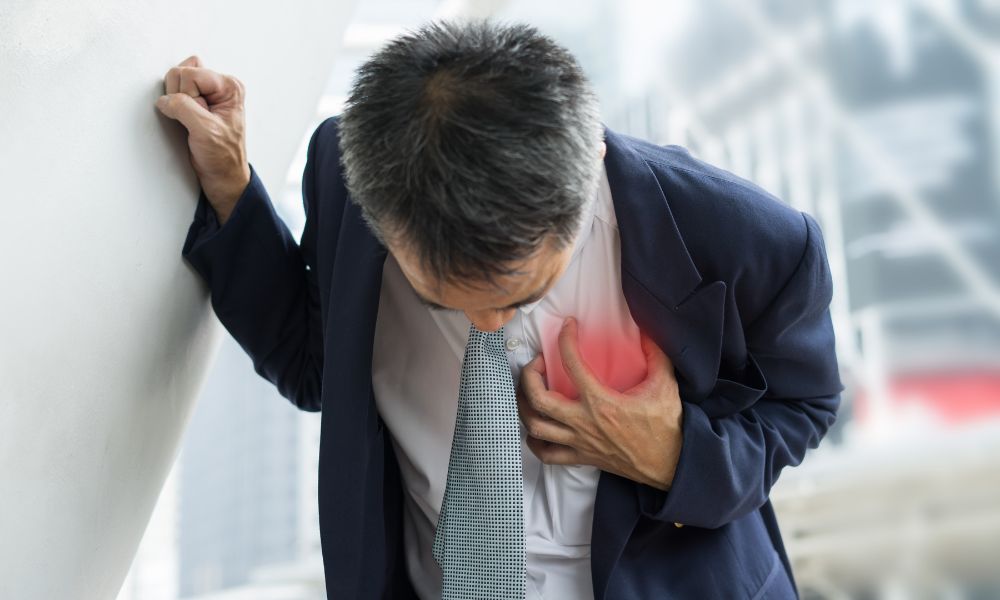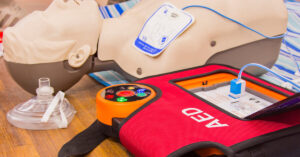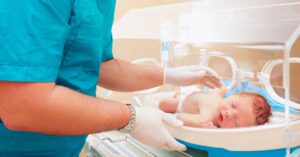Around 800,000 people have a heart attack annually in the United States. This statistic might shock you, but many people don’t take much action against heart attacks, disregarding the key signs until it’s too late. However, most heart attack symptoms are silent or mistaken for everyday aches and pains. To keep you informed, here are the seven signs that a heart attack is about to strike.
What Is a Heart Attack?
A heart attack, otherwise known as a myocardial infarction, occurs when the heart muscles begin to die due to a lack of proper blood flow. This lack of blood flow is usually the result of a blockage in the main arteries that supply blood to your heart. This blockage often happens due to a buildup of plaque, which is a fatty material that can easily get stuck in your arteries.
When a heart attack occurs, seeking help as soon as possible is essential. If one cannot seek immediate help or fails to do so, this can result in permanent heart damage or death.
The truth of the matter is that a heart attack can happen to anyone at any time, and they’re more frequent than you think—according to the CDC, someone has one every 40 seconds. As such, being aware of the common signs before a heart attack strikes is crucial. The sooner you make yourself aware of the signs, the quicker you’ll be able to get help if you experience them.
Signs of an Impending Heart Attack
Chest Pain
You probably aren’t surprised to see this symptom on the list—chest pain is one of the most recognizable symptoms of a heart attack. However, despite its commonality, many people tend to ignore this symptom because it’s a broad symptom that can result from a whole host of reasons. For example, you might have chest pain due to a recent workout, asthma or other respiratory condition, or even heightened emotions.
However, what you must know about chest pain is that it’s absolutely not something you should ignore. You’ll find that chest pain is a symptom that health-care practitioners take very seriously. Even if you think your chest pain is the result of something harmless, you should still go to a hospital just in case. You don’t want to disregard this crucial heart attack symptom when your life may be on the line.
Indigestion
When you’re experiencing an active heart attack, every area of your body isn’t receiving enough blood to function properly. You might especially notice this effect in your gastric system and mistake it for a stomachache. You might have feelings of indigestion, heartburn, vomiting, and nausea. You should seek medical care if these feelings of gastric upset co-occur with other heart attack symptoms.
Heightened Anxiety
Let’s face it: we all have anxiety, which is why you might feel shocked to see this symptom on the list. People with chronic depression, anxiety, or stress could have heightened risks of heart problems. The reason for this is that these chronic conditions can lead to high blood pressure, which significantly increases one’s risk of a stroke or heart attack. What’s more, one might mistake the feeling of anxiety or a panic attack for a heart attack, and vice versa, so being aware of the differences is important.
What’s the Difference Between a Heart Attack and an Anxiety or Panic Attack?
When you experience an anxiety attack or a panic attack, your heart rate will quicken, and you can have chest pain and body aches. These physical reactions are also heart attack symptoms, so it can feel frustrating and scary when you’re experiencing them and don’t know the difference. However, there are some key distinctions that will help you ascertain what’s really happening. For instance, when you have a heart attack, the symptoms might go away but come back later and worsen. What’s more, many people describe the chest pain of a heart attack as pressure, whereas people with anxiety often describe it as sharp or stabbing.
Shortness of Breath
Nearly all of us get a little out of breath when walking up a flight of stairs—that’s pretty normal. However, if you notice that you’re breathing much heavier than usual and your shortness of breath increases, this could be a cause for concern.
Dizziness
Our blood volume decreases significantly during a heart attack, resulting in dramatically low blood pressure. Low blood pressure may make you feel dizzy, light-headed, or weak. You probably experienced low blood pressure before if you stood up too quickly or didn’t hydrate enough. However, if you’re extremely dizzy or light-headed and also notice other heart attack symptoms, seek medical attention as soon as possible.
Body Aches
Sometimes we wake up with body aches due to a night of bad sleep. However, when your heart is in distress due to a heart attack, it will signal to other areas of your body that something isn’t right. This can result in what feels like common body aches—but it’s really a heart attack looming on the horizon. You could notice pain and aches in your jaw, neck, back, or arms. These symptoms, especially jaw and back pain, tend to be more common in women.
Fatigue
Unusual fatigue is a symptom most reported in women leading up to their heart attacks. They also noticed disturbances in their sleep, such as insomnia. Fatigue isn’t as recognizable a symptom, but it’s something to take serious note of. In fact, you may feel this symptom nearly a month before a heart attack strikes. It can be hard to notice unusual fatigue, especially if you lead a busy life, but try to recognize your usual energy levels and any sudden depletion that has no explanation.
Take Action
Having a heart attack is something no one wants to think about, but it’s all too common. If you want to learn more about how to help anyone in a cardiac crisis, CPR123 is here to help. We have Heartsaver first aid CPR/AED courses so that you can learn how to aid anyone in need. When we’re aware of the various warning signs leading up to a heart attack, we can take quick action to avoid disastrous consequences for ourselves and others.








